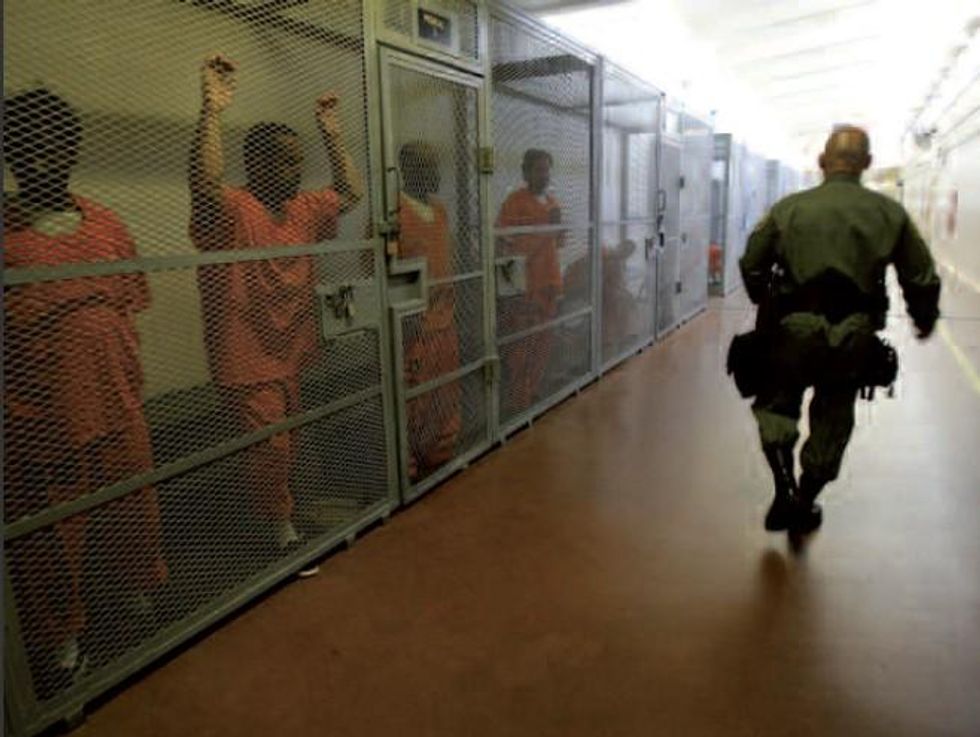

SUBSCRIBE TO OUR FREE NEWSLETTER
Daily news & progressive opinion—funded by the people, not the corporations—delivered straight to your inbox.
5
#000000
#FFFFFF
To donate by check, phone, or other method, see our More Ways to Give page.


Daily news & progressive opinion—funded by the people, not the corporations—delivered straight to your inbox.

Entitled A Living Death: Life Without Parole for Nonviolent Offenses, the study draws on interviews and surveys of hundreds of inmates, as well as court records and data from the state obtained through a Freedom of Information Act request, to paint a chilling picture of lives behind bars.
What are these offenses?
They could be as little as stealing a $159 jacket or selling $10 worth of marijuana, the report finds. Of the 3,278 cases reviewed for the study, 79% were convicted of nonviolent, drug-related crimes and 20% of nonviolent property crimes like theft. Most were handed mandatory minimums under "habitual offender" laws that require them to spend the rest of their lives behind bars.
Severe racial disparities are reflected in these numbers. Of cases reviewed, 65 percent are black, 18 percent are white, and 16 percent are latino. In Louisiana, a stunning 91 percent of inmates serving life for a nonviolent offense are black.
This is despite evidence that white people are just as likely, if not more likely, than black people to use drugs.
Who are the people behind these numbers?

Teresa Griffin was 26 years old when she was charged with transporting drugs for her then-boyfriend who she says was abusive and forced her to serve as a mule.
Anthony Jackson was 44 years old and working as a cook when he was convicted of burglary for stealing a wallet from a hotel room. Jackson says that his court-appointed defender did not adequately prepare the case, so he represented himself, even though he did not understand the charges against him. Two former burglary convictions were enough to land him behind bars for life. "I felt hurt and afraid [of

Dicky Joe Jackson, serving life in prison for a nonviolent offense, said, "I would rather have had a death sentence than a life sentence."
"We must change the laws that have led to such unconscionable sentences," said Jennifer Turner, ACLU Human Rights Researcher and author of the report. "For those now serving life without parole for nonviolent offenses, President Obama and state governors must step in and reduce their sentences."
"To do nothing is a failure of justice."
_____________________
Dear Common Dreams reader, The U.S. is on a fast track to authoritarianism like nothing I've ever seen. Meanwhile, corporate news outlets are utterly capitulating to Trump, twisting their coverage to avoid drawing his ire while lining up to stuff cash in his pockets. That's why I believe that Common Dreams is doing the best and most consequential reporting that we've ever done. Our small but mighty team is a progressive reporting powerhouse, covering the news every day that the corporate media never will. Our mission has always been simple: To inform. To inspire. And to ignite change for the common good. Now here's the key piece that I want all our readers to understand: None of this would be possible without your financial support. That's not just some fundraising cliche. It's the absolute and literal truth. We don't accept corporate advertising and never will. We don't have a paywall because we don't think people should be blocked from critical news based on their ability to pay. Everything we do is funded by the donations of readers like you. Will you donate now to help power the nonprofit, independent reporting of Common Dreams? Thank you for being a vital member of our community. Together, we can keep independent journalism alive when it’s needed most. - Craig Brown, Co-founder |

Entitled A Living Death: Life Without Parole for Nonviolent Offenses, the study draws on interviews and surveys of hundreds of inmates, as well as court records and data from the state obtained through a Freedom of Information Act request, to paint a chilling picture of lives behind bars.
What are these offenses?
They could be as little as stealing a $159 jacket or selling $10 worth of marijuana, the report finds. Of the 3,278 cases reviewed for the study, 79% were convicted of nonviolent, drug-related crimes and 20% of nonviolent property crimes like theft. Most were handed mandatory minimums under "habitual offender" laws that require them to spend the rest of their lives behind bars.
Severe racial disparities are reflected in these numbers. Of cases reviewed, 65 percent are black, 18 percent are white, and 16 percent are latino. In Louisiana, a stunning 91 percent of inmates serving life for a nonviolent offense are black.
This is despite evidence that white people are just as likely, if not more likely, than black people to use drugs.
Who are the people behind these numbers?

Teresa Griffin was 26 years old when she was charged with transporting drugs for her then-boyfriend who she says was abusive and forced her to serve as a mule.
Anthony Jackson was 44 years old and working as a cook when he was convicted of burglary for stealing a wallet from a hotel room. Jackson says that his court-appointed defender did not adequately prepare the case, so he represented himself, even though he did not understand the charges against him. Two former burglary convictions were enough to land him behind bars for life. "I felt hurt and afraid [of

Dicky Joe Jackson, serving life in prison for a nonviolent offense, said, "I would rather have had a death sentence than a life sentence."
"We must change the laws that have led to such unconscionable sentences," said Jennifer Turner, ACLU Human Rights Researcher and author of the report. "For those now serving life without parole for nonviolent offenses, President Obama and state governors must step in and reduce their sentences."
"To do nothing is a failure of justice."
_____________________

Entitled A Living Death: Life Without Parole for Nonviolent Offenses, the study draws on interviews and surveys of hundreds of inmates, as well as court records and data from the state obtained through a Freedom of Information Act request, to paint a chilling picture of lives behind bars.
What are these offenses?
They could be as little as stealing a $159 jacket or selling $10 worth of marijuana, the report finds. Of the 3,278 cases reviewed for the study, 79% were convicted of nonviolent, drug-related crimes and 20% of nonviolent property crimes like theft. Most were handed mandatory minimums under "habitual offender" laws that require them to spend the rest of their lives behind bars.
Severe racial disparities are reflected in these numbers. Of cases reviewed, 65 percent are black, 18 percent are white, and 16 percent are latino. In Louisiana, a stunning 91 percent of inmates serving life for a nonviolent offense are black.
This is despite evidence that white people are just as likely, if not more likely, than black people to use drugs.
Who are the people behind these numbers?

Teresa Griffin was 26 years old when she was charged with transporting drugs for her then-boyfriend who she says was abusive and forced her to serve as a mule.
Anthony Jackson was 44 years old and working as a cook when he was convicted of burglary for stealing a wallet from a hotel room. Jackson says that his court-appointed defender did not adequately prepare the case, so he represented himself, even though he did not understand the charges against him. Two former burglary convictions were enough to land him behind bars for life. "I felt hurt and afraid [of

Dicky Joe Jackson, serving life in prison for a nonviolent offense, said, "I would rather have had a death sentence than a life sentence."
"We must change the laws that have led to such unconscionable sentences," said Jennifer Turner, ACLU Human Rights Researcher and author of the report. "For those now serving life without parole for nonviolent offenses, President Obama and state governors must step in and reduce their sentences."
"To do nothing is a failure of justice."
_____________________